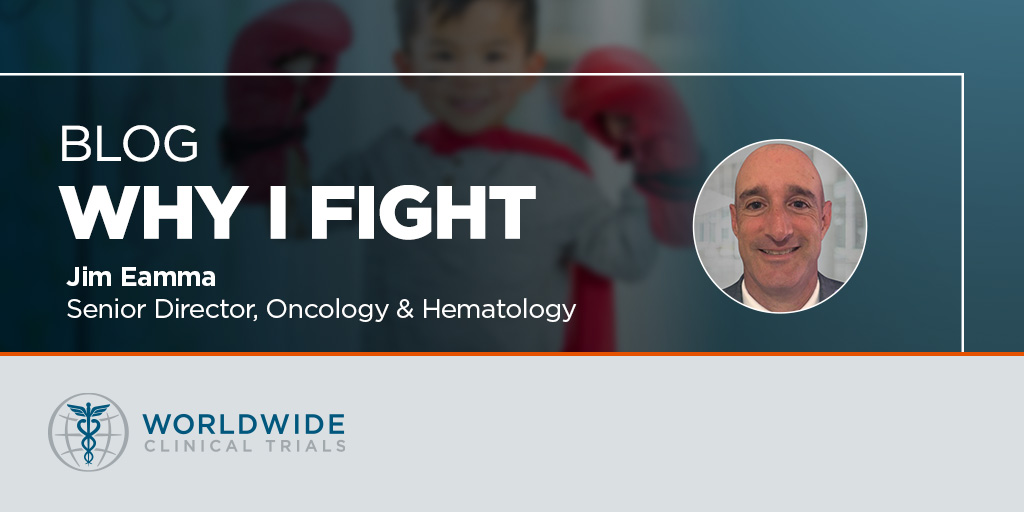
Life after cancer is about more than just survival. It’s not just the length of life that matters, but also the quality of that life. Join us as we celebrate cancer research awareness month and clinical trials awareness month.
The Patient Experience
The thing that really motivates me in cancer research is seeing how, in the last couple of decades, the landscape has evolved to where we’re not only focusing on curative intent but also on improving the patient’s experience with the illness.
I’ve had close family members who have received a cancer diagnosis; in fact, one right now is extremely sick. His quality of life is really poor due to the regimen that he’s on. Looking for new treatment options for patients that not only improve their chances of survival but also help to maintain their quality of life is what drives me, what I’m passionate about.
A Common Goal
As Franchise Area Lead at Worldwide Clinical Trials, I provide operational oversight and support for the project managers or global project leads that are assigned to studies. I am there to make sure they have everything that they need to be successful. I am a point of escalation for them as well as a sounding board for them to discuss ideas. I will support them with risk identification and mitigation, resourcing, financial management, or anything else they may need for a successful project delivery.
I’m also a point of escalation for the sponsor, as well. If the sponsor has any issues with the team’s performance, timelines, deliverables, risk, etc., I’m there to make them feel supported and ensure that we’re doing everything we can do to help them reach their study goals, and their corporate goals, as well.
Ultimately, if these new treatments prove to be effective, we’re trying to get them out to patients as quickly as possible. I utilize my experience from the past 20 years to help the team navigate their projects operationally and logistically so that we can support the sponsors in getting these drugs to market.
A New Approach to Patient Safety
The COVID-19 crisis accelerated the need for decentralized medicine or decentralized research. With oncology patients being immunocompromised, the pandemic demanded some new ways of working. We interjected telemedicine into research to reduce the number of inpatient visits. We found ways to deploy technologies so that patients can visit with their physicians and study coordinators online rather than in person. We’ve shifted to using local labs and other health vendors to support collection of samples so that the patients can stay in their homes, limit their interaction with the public, and stay safe.
COVID-19 really accelerated the need for us to better utilize technology to create a more streamlined process. This shift has reduced expenses for clinical research and created a safer environment for our patients.
Roadblocks and Detours
Some people have the misconception that there is one all-encompassing cure for cancer. This idea is so far from the truth.
Just imagine a superhighway of main highways, urban roads, farm-to-market roads, back streets, and alleys all of which can support you in getting to your desired destination. Say you’re driving home on a highway and you come to an accident that’s shut down the road. As you’re getting detoured, you check your GPS for an alternate route. The alternate route takes you down some back roads, which gets you around the accident and back on the highway toward home. Then, perhaps, there is another accident. Again, you and/or your GPS need to determine an alternate path around the accident so that you can get to your destination.
For instance, let’s say we are treating a patient who has breast cancer, and we get them in remission, which means basically their tumors are still present but are no longer growing. During that time, just imagine the tumors are stuck on the highway but are now putting a new path into their GPS, saying, “Okay, what is my alternate path to continue to grow?” It might take them a month, two months, six months, maybe two years, but eventually the tumors find another route.
Every cancer has a biochemical “highway” or pathway it uses to grow and spread. The scientific and medical community has been working to develop drugs that block these highways/pathways. However, as soon as we block one pathway or even two or three pathways, cancer seems to find another route. So, ultimately, as scientists and doctors, we are trying to map out this biochemical superhighway to determine the roadblocks we need to put in place in order to prevent cancer from ever reaching its destination. This is why those of us in oncology research keep fighting.
More Precision, Improved Quality of Life
The thing I’m most hopeful for really comes back to quality of life. We’re developing targeted therapies for various pathways. But when it comes down to it, the treatment pathways and treatment options that we’re developing are much less toxic than our historical regimens. It’s rewarding to see these patients coming out and knowing that the safety and toxicity profiles of these new treatments are so much better.
Even in patients with advanced disease with a prognosis of, say, 12 months, it gives me hope to know that they will have a good quality of life in the time they have left. They don’t have to spend their last days feeling sick and exhausted, but instead they can make the most of their precious time with family and friends.
Learn more about Jim and his work with oncology at Worldwide Clinical Trials.


